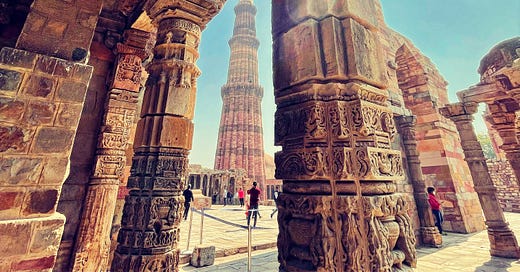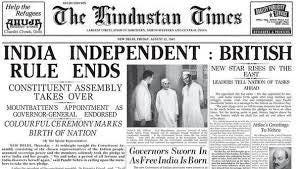skin
I am but aged skin
Eyes reddened with all I've seen
Nails blunted from walls I've scaled
Hair that flailed in many winds
*
Journeys that were so long and hard
Sometimes unable to take one more step
Spat out with waters soaked in my blood
With room to breathe but I can only sigh
*
Forks & betrayals so many I couldn't recall
Tears are water, don't wash off blood
My collections of roses and thorns and mud
I fell and crawled and stood up again
*
Rode aspiration horses of broken legs
Uprooted from land that was mine, familiar
My heart sent off to a permanent exile
So yes I don't know how to cry
*
Now I smile, and laugh but it ends in ache
Such stories you couldn't imagine in dreams
My accounts could save you some wounds
Won't you sit a while, listen to me?
---
reena
from my book Arrivals & Departures: Journeys in Poems
This poem is for the survivors of the 1947 Partition of India (more below).
It’s August and time to celebrate the 75th anniversary of India’s independence from the British on 15th August 1947!
Sadly, August is also the time to reflect on India’s tragic 1947 Partition when the British, as they were leaving, hastily drew a line to divide India and create the Islamic Republic of Pakistan. The British did this largely because leaders of undivided India could not trust each other sufficiently to share power. In particular, Nehru (India’s first Prime Minister-to-be) and Jinnah (Pakistan’s first Governor-General), both upper class barristers focused on shoring up their power, lacked the foresight to handle reality on the ground. Ironically, both were liberal, enlightened men, with little use for religion in their personal lives. But they could not come to a political compromise when it mattered.
Unfortunately, Partition created a gargantuan tragedy that left about 2 million dead, and drove an estimated 14+ million to migrate — one of the largest human displacements in history! Yet the term “migration” hardly represents what transpired. People who’d lived in towns and villages for generations as far back as they could count, left homelands, generational histories, a lifetime of community and the only life they had ever known. Perhaps hard to fully appreciate in our mobile, global times but this violent uprooting created multigenerational trauma.
Truth towards healing: The 1947 Partition Archive
Both of my own parents were refugee children of Partition. My mother arrived in India as a 5 year old from Peshawar, my father as a 12 year old from Sargodha. Growing up in India I learned about Partition from my elders, amid much grief and trauma. I wondered if their stories mirrored those on the “other” side. I was also struck by the lack of detail in school textbooks. Possibly a fear of reigniting past insanity caused historians to bury this history. But such expunging hasn’t served the subcontinent well.
People on all sides still feel wronged by the events of this time.
Peace between India and Pakistan, even 75 years later, is a dream I don’t easily indulge. But if people of the subcontinent are to heal, then an honest encounter with history needs to be the first step. That’s why for over a decade, I’ve volunteered as a Citizen Historian with the non-profit The 1947 Partition Archive, whose mission is to help record and archive personal stories of witnesses of Partition. This initiative has created an unprecedented people’s history of Partition — over 10,000 accounts to date!
My own experience as a citizen historian interviewing and recording many tens of witnesses, each of them over several hours, has been transformative. Many elders I recorded hadn’t shared their stories even with their children. Several wept openly.
When I first started as a citizen historian, I was eager to catalog our people’s history via personal narratives for future generations. But I soon came to cherish the privilege of helping our elders tell their stories and finally feel heard.
My poem is dedicated to those brave elders whose life histories I’ve had the privilege to record, and whose courage and resilience is a source of strength in my darkest hours.
Owning it…
A lot has been written about the ruthless divide-and-rule policy the British employed to rule India. There’s also no doubt about their intention in colonizing the subcontinent: economic plundering via the worst kind of government supported crony enterprise the world has ever seen. And they only left when WW2 rendered them broken, penniless.
But it’s too easy to simply blame the British for violence during Partition. Far too many people indulge in this single-dimensional attribution. I’ve even come across disingenuous references to Partition as a British-led “genocide”. The truth is far more terrible: Partition violence resulted from the people of the sub-continent killing each other.
Unfortunately, many local Hindu, Muslim, and Sikh leaders exhorted their people, even directly leading mobs to perpetrate unconscionable inter-religious violence. As a result ordinary people, who had coexisted peacefully for generations, turned on each other. Looting, pillaging, killing, rape and worse ensued. Millions who found themselves on the “wrong” side of the new/anticipated border became victims of this madness. Almost every Partition survivor I talked with shared a similar narrative. I wrote about the particularly horrific fate of women during Partition, last August.
There’s no doubt the British sowed a bitter crop, recklessly drew the Partition line and abandoned India. I’m not downplaying their culpability already covered in many excellent books. Instead I’m raising questions for self-reflection for people of the subcontinent i.e., our people.
What was our people’s role in this sordid history? What happened to any collective conscience when exhorted to loot, kill, rape in the name of religion? Even today, how many (diaspora included) condone intolerance of other religions? How far are we willing to let our leaders take us in the name of religion?
Unfortunately even 75 years hence, the subcontinent remains a tinderbox of endless religious animosities, including within India and Pakistan. The two countries — despite a common heritage, culture, music, language, food, etc. — remain deadly enemies across one of the most militarized borders in the world.
What have we learned?
Who knew?
I came across this poem Partition by the British-America poet W H Auden from 1966. It’s a caustic criticism of the line drawn by the British barrister Cyril Radcliffe…
Partition
Unbiased at least he was when he arrived on his mission,
Having never set eyes on this land he was called to partition
Between two peoples fanatically at odds,
With their different diets and incompatible gods….







Hi Reena, I read your beautifully written prose and poetry about partition of India. It was not only enjoyable but also very educational. I was not aware of all the details about drawing the boundaries between the two countries, as you outlined in your writeup. Growing up in the 1950s and 1960s in Delhi (India), in a family which was displaced by the partition of the subcontinent, I had heard numerous stories about the hardships and suffering faced by people on both sides of the boundary. Even though I was born, in 1950, in free India, I always felt the pain and anguish of my parents and grandparents because of their uprooting from Sialkot/Lahore where they used to live peacefully with people of all religions. My father was a journalist (published a weekly paper called Nigaristan) and his father (my grandfather) was a postmaster, both in Lahore. The ladies of the family used to live in Sialkot in the ancestral large Haveli. Both my father as well as grandfather had several Muslim employees with whom they had very harmonious relationships. At the time of partition, when all the human beings became barbarous, they were given two choices -- either convert religion or leave with no belongings. They took the second choice since my grandparents on my mother's side were well-settled in Delhi in a home that they had gotten built only a few years earlier in Prem Nagar. In that toxic atmosphere, my father and grandfather, with assistance from some of their loyal Muslim employees, went to Sialkot to fetch the ladies of the family. The ladies had bagged some jewelry and other valuable items with them. They succeeded in getting back to Lahore with the whole family when the mayhem started. They lost all their belongings and were barely able to escape in a train bound for Delhi. All this episode had disastrous effect on my grandfather. In Delhi, my grandfather started having nightmares about partition and started developing bad health. Due to his worsening condition, he passed away in early 1948. Even though I never saw my paternal grandfather, I experienced a strange closeness with him through all the anecdotal stories my father used to tell me.
Thank you, Reena, for creating these priceless stories and poems that touched my heart and soul.
With my blessings, Jogindra Chachaji
Wow. This was educational and sad. Thanks for writing about it.